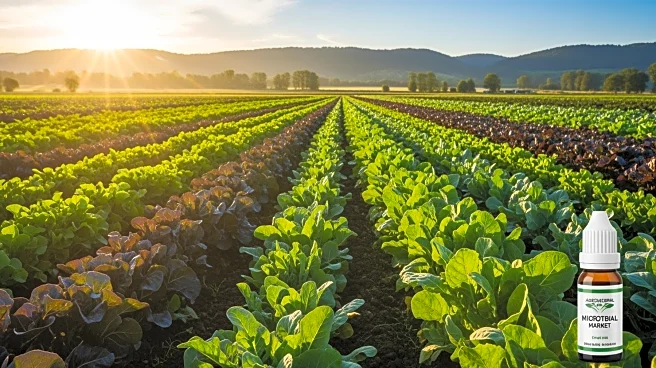What's Happening?
The agricultural microbial market is experiencing significant growth as global farming practices increasingly prioritize sustainability, efficiency, and soil health. Microbials, which include beneficial
bacteria, fungi, viruses, and protozoa, play a crucial role in promoting plant growth, enhancing nutrient uptake, and protecting crops from diseases. According to Persistence Market Research, the market is projected to grow from $8.2 billion to $17.47 billion by 2032, driven by rising demand for eco-friendly farming inputs and the adoption of organic and regenerative agricultural practices. Farmers are moving away from traditional chemical fertilizers and pesticides due to their negative effects on soil quality, human health, and the environment, opting instead for microbial-based solutions that align with global initiatives for climate-smart agriculture.
Why It's Important?
The shift towards microbial-based agricultural products is significant for the U.S. farming industry, as it addresses environmental concerns and supports sustainable agriculture. These products reduce dependency on synthetic agrochemicals, improve soil biodiversity, and enhance agricultural ecosystems' resilience. The growing demand for organic food and sustainable practices is boosting the market for natural crop protection and enhancement products. This trend is supported by government initiatives and policy support, particularly in North America and Europe, where regulations are increasingly favoring bio-based agricultural inputs. The market's expansion reflects a broader movement towards environmentally responsible farming, which could lead to healthier food production and improved soil health.
What's Next?
The agricultural microbial market is expected to continue its growth trajectory, driven by technological advancements in microbial strain identification and formulation development. As awareness of soil health and the benefits of microbial products increases, adoption rates are likely to rise. Companies investing in research and development for strain improvement and formulation stability are poised to gain a competitive edge. The integration of precision agriculture and digital farm management platforms will further enhance the effectiveness of microbial solutions, enabling targeted and data-driven agricultural practices. The market's expansion is likely to influence global agricultural policies and practices, promoting a shift towards more sustainable and regenerative farming methods.
Beyond the Headlines
The rise of microbial-based agricultural products highlights ethical and environmental considerations in farming. By reducing reliance on chemical fertilizers and pesticides, these products contribute to soil regeneration and biodiversity preservation. The market's growth also underscores the importance of innovation in addressing climate change and food security challenges. As microbial solutions become more widely adopted, they could lead to long-term shifts in agricultural practices, promoting a more sustainable and resilient food system.










